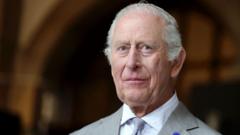In a momentous visit, King Charles III arrived in Canada, marking his first trip as king and his 20th visit to the country overall. The trip holds special significance as the King is slated to deliver the Speech from the Throne, a traditional address that lays out the government's agenda for the coming parliamentary session. To date, the monarch's presence at such an occasion is rare, with the last time being in 1977 when Queen Elizabeth II fulfilled the duty. This visit aligns with Prime Minister Mark Carney's invitation to strengthen Canada's sovereignty amidst tensions with the United States. As the King engages with Canadian culture, he underscores the ongoing relationship between Canada and the Crown, an essential element in contemporary discourse surrounding national identity and history.
King Charles III's Historic Visit to Canada and the Speech from the Throne

King Charles III's Historic Visit to Canada and the Speech from the Throne
King Charles III embarks on his first official visit to Canada since his coronation, delivering a significant address to parliament.
King Charles III's visit signifies a pivotal moment for Canada as it navigates its relationship with the monarchy while reinforcing its identity on the global stage.
The article text:
King Charles III's inaugural visit to Canada as monarch has drawn significant attention, combining royal tradition with contemporary geopolitics. The ceremony began on Monday, showcasing vibrant displays of Canada’s identity and diversity as a counterpoint to strained relations with its southern neighbor, the United States. King Charles is expected to deliver the crucial Speech from the Throne on Tuesday, formally opening Canada’s 45th session of parliament.
Traditionally, the Speech from the Throne is delivered by the governor general, representing the Crown in Canada; however, Prime Minister Mark Carney has invited the King to assume this responsibility, a request viewed as strategically reinforcing Canadian sovereignty at a time of rising tensions with the U.S. Over recent months, U.S. President Donald Trump's administration has exerted pressure on Canada through tariffs and dismissive remarks about its political leaders.
This historic gesture emphasizes a re-emphasis on the significance of the monarchy within Canadian governance. Governor General Mary Simon highlighted that the visit underscores the enduring bond between Canada and the Crown. The King’s presence serves as a reminder of shared global values, and the visit could nurture discussions regarding the evolving role of the monarchy in Canada.
Throughout his visit, King Charles III and Queen Camilla participated in ceremonial events such as a tree-planting ceremony, symbolically linking their family’s heritage to Canada. They were received with military honors upon their arrival, highlighting the importance of this royal visit in contemporary Canadian politics.
The visit marks not only a return of royal engagement after King Charles III's coronation but also a recognition of the nuanced relationship between Canada and the monarchy, as the current political landscape poses challenges that call for unity and national identity. The King’s role, while constitutionally apolitical, has involved gestures of support for Canada, which may have broader implications for the narrative of monarchy in the 21st century.
As King Charles prepares to address parliament, Canadians are likely to reflect on the significance of this event against the backdrop of their historical relationship with the Crown, questioning its relevance and future in an increasingly independent Canada.
The article text:
King Charles III's inaugural visit to Canada as monarch has drawn significant attention, combining royal tradition with contemporary geopolitics. The ceremony began on Monday, showcasing vibrant displays of Canada’s identity and diversity as a counterpoint to strained relations with its southern neighbor, the United States. King Charles is expected to deliver the crucial Speech from the Throne on Tuesday, formally opening Canada’s 45th session of parliament.
Traditionally, the Speech from the Throne is delivered by the governor general, representing the Crown in Canada; however, Prime Minister Mark Carney has invited the King to assume this responsibility, a request viewed as strategically reinforcing Canadian sovereignty at a time of rising tensions with the U.S. Over recent months, U.S. President Donald Trump's administration has exerted pressure on Canada through tariffs and dismissive remarks about its political leaders.
This historic gesture emphasizes a re-emphasis on the significance of the monarchy within Canadian governance. Governor General Mary Simon highlighted that the visit underscores the enduring bond between Canada and the Crown. The King’s presence serves as a reminder of shared global values, and the visit could nurture discussions regarding the evolving role of the monarchy in Canada.
Throughout his visit, King Charles III and Queen Camilla participated in ceremonial events such as a tree-planting ceremony, symbolically linking their family’s heritage to Canada. They were received with military honors upon their arrival, highlighting the importance of this royal visit in contemporary Canadian politics.
The visit marks not only a return of royal engagement after King Charles III's coronation but also a recognition of the nuanced relationship between Canada and the monarchy, as the current political landscape poses challenges that call for unity and national identity. The King’s role, while constitutionally apolitical, has involved gestures of support for Canada, which may have broader implications for the narrative of monarchy in the 21st century.
As King Charles prepares to address parliament, Canadians are likely to reflect on the significance of this event against the backdrop of their historical relationship with the Crown, questioning its relevance and future in an increasingly independent Canada.




















